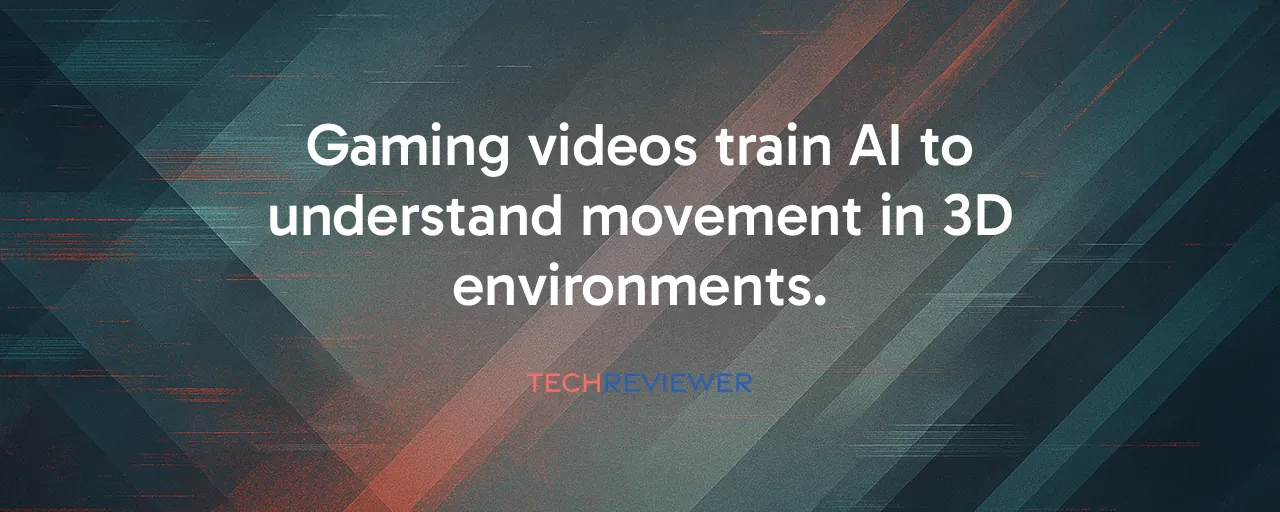When Gamers Teach AI to Think in 3D
Every time a gamer uploads a highlight clip of a clutch victory or an epic fail, they're unknowingly contributing to a revolution in artificial intelligence. General Intuition, a new AI research lab spun out from Medal, a platform hosting 2 billion gaming videos yearly from 10 million users, is tapping this data to train AI agents that grasp how objects and characters move through space over time. This ability, known as spatial-temporal reasoning, lets these agents navigate virtual game worlds and real-world environments with a human-like understanding of physics and motion.
Unlike text-based AI systems that excel at language but stumble over physical relationships, these agents learn from first-person gameplay footage, mimicking how humans see and interact with their surroundings. Medal's dataset, packed with clips from thousands of games, captures extreme moments, such as last-second headshots or catastrophic missteps, that provide rich, edge-case data for training. The result? AI that can predict actions in unfamiliar settings, from open-world adventures to real-world rescue missions.
Leveling Up Gameplay With Smarter NPCs
Game developers have long dreamed of non-player characters (NPCs) that feel alive, adapting to players' skills and choices in real time. General Intuition's AI agents are making this a reality. By learning from gaming videos, these agents can power NPCs that adjust difficulty on the fly, creating personalized challenges that keep players hooked. A standout example is Left 4 Dead's AI Director, which monitors player stress and tweaks enemy spawns to maintain a thrilling pace. This system kept players coming back by balancing challenge and reward, a lesson General Intuition is scaling with its models.
These AI-driven NPCs don't just follow scripts; they react dynamically to player actions, potentially crafting unique storylines or adjusting game worlds to match skill levels. For game studios, this means longer player engagement without needing costly content updates. However, developers face a trade-off: integrating these AI systems requires rethinking game design to prioritize adaptability over traditional, linear storytelling.
From Virtual Worlds to Real-World Rescues
Beyond gaming, General Intuition's technology is poised to guide drones and robots through unpredictable environments. Search-and-rescue drones, for instance, already use visual navigation techniques to operate in GPS-denied settings like collapsed buildings or dense forests. By training on gaming data, General Intuition's AI agents can enhance these drones, enabling them to interpret visual cues and predict movement paths with precision. Real-world deployments have shown drones navigating complex terrains to locate survivors, a capability General Intuition aims to refine.
The leap from virtual to physical systems hinges on a clever insight: gamers use controllers to navigate virtual spaces, just as operators use similar interfaces for drones or robotic arms. This parallel allows AI trained on gaming inputs to transfer skills to physical machines. However, challenges remain: real-world physics introduces variables like sensor noise and material properties that games don't replicate, requiring careful fine-tuning.
Navigating the Ethical Minefield
As promising as this technology is, it's not without hurdles. Training AI on gaming videos raises thorny questions about privacy and intellectual property. Players uploading clips to Medal may not realize their gameplay is fueling AI systems, sparking debates over consent and data ownership. Game developers and publishers also worry about copyright, as their assets, such as characters, environments, and mechanics, could be swept into AI training without clear legal frameworks.
On the flip side, advocates for AI development argue that gaming data's scale and diversity make it indispensable for building robust systems. With $133.7 million in seed funding from investors like Khosla Ventures, General Intuition is betting it can navigate these concerns while delivering value to both gamers and industries like robotics. Balancing innovation with ethical responsibility will be key to earning trust from players and regulators alike.
A New Frontier for AI Innovation
General Intuition's work signals a broader shift in AI, moving beyond text to embrace vision and physical interaction. The gaming industry stands to gain richer, more immersive experiences, while robotics and autonomous systems could see faster, more reliable deployments. The real promise lies in bridging these worlds by using virtual data to solve real-world problems. As AI learns to see and move like humans, the line between game and reality blurs, opening doors to applications we're only beginning to imagine.
The path forward isn't simple. Computational costs, legal uncertainties, and the need for real-world validation pose significant challenges. Still, by leveraging the passion and creativity of gamers, General Intuition is crafting AI that doesn't just play games; it changes how we interact with the world around us.
